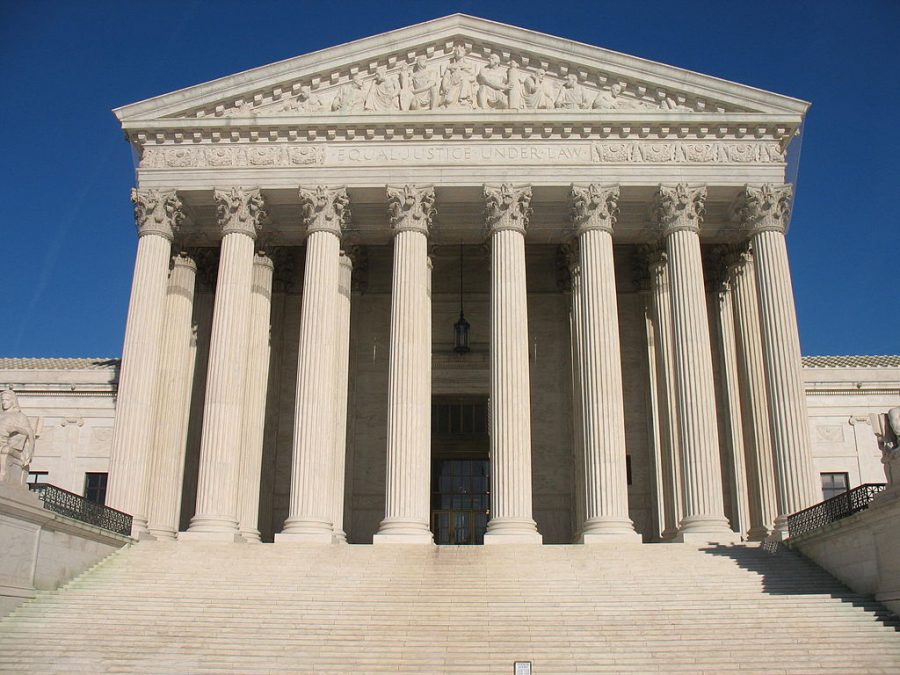Beyond the Bison: Players unions speak out as U.S. Supreme Court decision regarding sports betting draws near
April 19, 2018
President George H. W. Bush signed the Professional and Amateur Sports Protection Act (PASPA) into law on Oct. 28, 1992 that then went into effect on Jan. 1, 1993. The goal of the bill was to stop the spread of sports betting in the United States. It was a response not just to sports gambling, but to the expansion of gambling legalization, which was thought to have many undesirable economic and social costs.
In November 2012, New Jersey voters instructed state lawmakers to legalize sports betting. The bill that the State Legislature constructed would have permitted the state’s racetracks and Atlantic City casinos to offer Las Vegas-style sports betting. In January 2012, former New Jersey Governor Chris Christie signed the bill into law. However, almost immediately, the NHL, NBA, MLB, NFL, and the NCAA sued to stop New Jersey’s sports betting before it could even start. The Third Circuit Court of Appeals ruled against sports betting – citing a violation of PASPA – before the case could reach the U.S. Supreme Court.
But the Supreme Court agreed June 2017 to hear New Jersey’s case against the constitutionality of PASPA. The main argument against PASPA is that requiring states to maintain prohibitions of a law is just as much of a constitutional violation as forcing them to act.
If PASPA is found unconstitutional, the decision would have seismic effects on the sports betting world. It would open the door for any state to legalize and regulate sports betting. If New Jersey wins its appeal in the courts, a gold rush might occur, with states already having laws lined up to be enacted if changes are made.
Currently, nearly all of sports betting is illegal and off the books, and therefore estimating the size of the market would be unpredictable. Billions of dollars (some estimate as much $400 billion) have the opportunity to be taxed. State legislators are drooling over the opportunity to bring in tremendous tax revenue that would come from the regulation of sports betting.
The major sports leagues hope to benefit in many ways. For example, a study cited in the briefing on Capitol Hill December 2017 indicated that non-betting NFL fans watch an average of 16 NFL games per year, while betting NFL fans watch an average of 40 NFL games per year. The leagues hope that the legalization of sports gambling will convert more non-betters to betters and, with the aforementioned logic, will increase ratings.
Another question that has arisen is: how much of the market that operates off the books will continue to do so? If tax rates take a high enough percentage of potential winnings, what stops the offshore markets from continuing in the same manner as they always had?
The reason that so many people expect the Supreme Court to rule on New Jersey’s side has to do with how the legal fight has gone so far. The fact that the Supreme Court is hearing the case, despite all the lower courts striking it down and against the Solicitor General’s recommendation, is a rare ordeal, and, because of this, legal experts predict a reversal of PASPA. Representatives from the players associations of the MLB, NBA, NFL, and NHL put out a joint statement on April 13 about their position on the issue.
“Our unions have been discussing the potential impact of legalized gambling on players’ privacy and publicity rights, the integrity of our games and the volatility on our businesses,” the statement said. “Betting on sports may become widely legal, but we cannot allow those who have lobbied the hardest for sports gambling to be the only ones controlling how it would be ushered into our businesses. The athletes must also have a seat at the table to ensure that players’ rights and the integrity of our games are protected.”
The idea that players have the right to determine if someone bets on them is not one that will hold up. Today, one could bet on the outcome of the Oscars, horse races, elections, and the outcome of popular TV show plots. Daniel Day Lewis doesn’t take a cut when he wins an Oscar, and sports players shouldn’t be requesting a cut either. The leagues should definitely have an active voice in the sports gambling transition if it does happen, however. Market forces may not act in the best interests of the players.
The implications of the reversal of PAPSA would be staggering, potentially setting precedent for a whole slew of other state and federal issues that have been contested in recent years, from the legalization of marijuana to gun control, immigration, and sanctuary cities. The U.S. Supreme Court is expected to announce its ruling by June 2018.





















